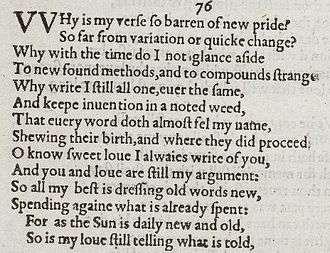Sonnet 76
| Sonnet 76 | |||||||
|---|---|---|---|---|---|---|---|
 Sonnet 76 of the 1609 Quarto | |||||||
|
| |||||||
| |||||||
Sonnet 76 is one of 154 sonnets written by the English playwright and poet William Shakespeare. It's a member of the Fair Youth sequence, in which the poet expresses his love towards a young man.
Synopsis
This poem repeats the theme of Sonnet 38, which examines the issue of the poet's obsession with the Youth as the repeated and sole theme of his poetry.
The poet expresses frustration with his poetry; that it is repetitive and he can't find inspiration. He ponders finding inspiration from other artists. He ends the poem justifying the endless, uninspired, repetition of his love poetry to the endless repetition to the rising and setting sun.
Structure
Sonnet 76 is an English or Shakespearean sonnet. The English sonnet has three quatrains, followed by a final rhyming couplet. It follows the typical rhyme scheme of the form, abab cdcd efef gg and is composed in iambic pentameter, a type of poetic metre based on five pairs of metrically weak/strong syllabic positions. The 7th line exemplifies a regular iambic pentameter:
× / × / × / × / × / That every word doth almost tell my name, (76.7)
- / = ictus, a metrically strong syllabic position. × = nonictus.
The 1st line begins with a common variation, an initial reversal (a figure repeated several times in the sonnet), and ends with a less-frequent one, the rightward movement of the 4th ictus (resulting in a 4-position figure, × × / /, sometimes referred to as a minor ionic). The 2nd line repeats the minor ionic at the same point in the line:
/ × × / × / × × / / Why is my verse so barren of new pride, × / × / ×/ × × / / So far from variation or quick change? (76.1-2)
Controversial interpretation
"Noted weed" is usually glossed to mean familiar clothing. The Norton Shakespeare annotates "and keep invention in a noted weed" thus: And keep literary creativity in such familiar clothing. This conforms with the Oxford English Dictionary's definition of Weed, sb2: 1: an article of apparel; a garment, and is consistent with the theme of mending, re-using, etc. ("all my best is dressing old words new").[2]
Although no academics concur, it has been suggested that Shakespeare is referring to the influence of drugs in poetry creation,[3] with the subject phrase "Noted weed" referring to the use of cannabis, which was common in England at the time.[4][5] In this interpretation, "Compounds strange" is taken to be a reference to strange chemicals (i.e. drugs), instead of a use of inverted construction, a common poetical device common to Shakespeare. One could argue the poet is thinking he could use drugs to be inspired. He then states he decides not to use such inspiration. (The poet does not "glance aside". Also, he decides to keep the inspirational in the "noted weed" rather than use it.)
The colloquialism "weed" was not used in reference to the drug cannabis in the USA until the 1920s.[6] However, the term could have been used as a reference to the commonplace plant, which was mass-produced for fiber.
Interpretations
- Diana Rigg, for the 2002 compilation album, When Love Speaks (EMI Classics)
In music
- Poeterra recorded a pop rock version of Sonnet 76 on their album "When in Disgrace" (2014).
- Alfred Janson set the sonnet for SATB choir with Tenor/Baritone solo (2000).
References
- ↑ Pooler, C[harles] Knox, ed. (1918). The Works of Shakespeare: Sonnets. The Arden Shakespeare [1st series]. London: Methuen & Company. OCLC 4770201.
- ↑ Norton Shakespeare, ed. Stephen Greenblatt. NY: Norton, 1997.
- ↑ CNN Online
- ↑ Harvard Magazine Sep-Oct 2001.
- ↑ Nkosi, Milton. "Much ado about puffing or did Shakespeare smoke cannabis?". BBC News. BBC News. Retrieved 12 August 2015.
- ↑ "Dictionary.com". Retrieved 30 September 2012.
Further reading
- First edition and facsimile
- Shakespeare, William (1609). Shake-speares Sonnets: Never Before Imprinted. London: Thomas Thorpe.
- Lee, Sidney, ed. (1905). Shakespeares Sonnets: Being a reproduction in facsimile of the first edition. Oxford: Clarendon Press. OCLC 458829162.
- Variorum editions
- Alden, Raymond Macdonald, ed. (1916). The Sonnets of Shakespeare. Boston: Houghton Mifflin Company. OCLC 234756.
- Rollins, Hyder Edward, ed. (1944). A New Variorum Edition of Shakespeare: The Sonnets [2 Volumes]. Philadelphia: J. B. Lippincott & Co. OCLC 6028485.
- Modern critical editions
- Atkins, Carl D., ed. (2007). Shakespeare's Sonnets: With Three Hundred Years of Commentary. Madison: Fairleigh Dickinson University Press. ISBN 978-0-8386-4163-7. OCLC 86090499.
- Booth, Stephen, ed. (2000) [1st ed. 1977]. Shakespeare's Sonnets (Rev. ed.). New Haven: Yale Nota Bene. ISBN 0-300-01959-9. OCLC 2968040.
- Burrow, Colin, ed. (2002). The Complete Sonnets and Poems. The Oxford Shakespeare. Oxford: Oxford University Press. ISBN 978-0192819338. OCLC 48532938.
- Duncan-Jones, Katherine, ed. (2010) [1st ed. 1997]. Shakespeare's Sonnets. The Arden Shakespeare, Third Series (Rev. ed.). London: Bloomsbury. ISBN 978-1-4080-1797-5. OCLC 755065951.
- Evans, G. Blakemore, ed. (1996). The Sonnets. The New Cambridge Shakespeare. Cambridge: Cambridge University Press. ISBN 978-0521294034. OCLC 32272082.
- Kerrigan, John, ed. (1995) [1st ed. 1986]. The Sonnets ; and, A Lover's Complaint. New Penguin Shakespeare (Rev. ed.). Penguin Books. ISBN 0-14-070732-8. OCLC 15018446.
- Mowat, Barbara A.; Werstine, Paul, eds. (2006). Shakespeare's Sonnets & Poems. Folger Shakespeare Library. New York: Washington Square Press. ISBN 978-0743273282. OCLC 64594469.
- Orgel, Stephen, ed. (2001). The Sonnets. The Pelican Shakespeare (Rev. ed.). New York: Penguin Books. ISBN 978-0140714531. OCLC 46683809.
- Vendler, Helen, ed. (1997). The Art of Shakespeare's Sonnets. Cambridge, MA: The Belknap Press of Harvard University Press. ISBN 0-674-63712-7. OCLC 36806589.
.png)
